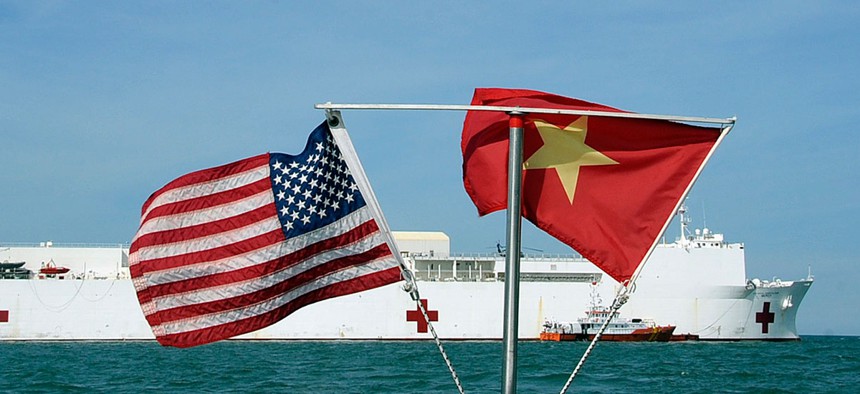
U.S. and Vietnamese flags fly in unison as the Military Sealift Command hospital ship USNS Mercy (T-AH 19) sits on station in the Gulf of Tonkin, July 13, 2012. Mass Communication Specialist 2nd Class Roadell Hickman/Navy file photo
Defense Secretary: Wider U.S.-Vietnam Military Relations Not ‘Directed’ at China
Lifting the arms embargo continues years of Obama’s efforts to link American and Vietnamese militaries, Carter said, as president visits country.
ABOARD A U.S. MILITARY AIRCRAFT — Lifting the U.S. arms embargo for Vietnam will lead to warmer ties between the two countries’ militaries, including maritime cooperation in the contested South China Sea, U.S. Defense Secretary Ash Carter said Monday. But Carter and President Barack Obama, who is visiting Vietnam, insisted the move was not directed at China, which is locked in a dispute with Hanoi and other neighbors over ownership of islands throughout the sea.
“The decision to lift the ban was not based on China or any other considerations,” Obama said at a press conference in Hanoi on Monday. “It was based on our desire to complete what has been a lengthy process of moving towards normalization with Vietnam.”
While Carter echoed Obama, saying the move to sell arms to Vietnam was not aimed at Beijing, he said “there’s no question that China’s actions there, particularly those over the past year, have heightened concern in the region, and that’s another factor that causes everyone to want to work with us.”
“In terms of its wider regional meaning, what it is is a reflection of the fact that more and more countries in the region are coming to the United States to do more and more with us because of their general concern with the security environment,” Carter told reporters en route to New Haven, Conn., where he will watch the commissioning of Yale’s first graduating ROTC class since the 1970s.
Deepening U.S.-Vietnamese military cooperation is part of a larger trend under Obama of improving bilateral relations with Pacific Rim countries, Carter said.
Washington has increasingly been leaning on Hanoi to counter Beijing’s military buildup.Earlier this morning, Obama announced that the U.S. will end a decades-long embargo on the sales of lethal arms to Vietnam.
“We're going to continue to engage in the case-by-case evaluations of these sales,” Obama said. “But what we do not have is a ban that's based on an ideological division between our two countries, because we think, at this stage, both sides have established a level of trust and cooperation, including between our militaries, that is reflective of common interests and mutual respect.”
Then U.S.-Defense Secretary Leon Panetta visits the USNS Richard Byrd in Cam Ranh Bay, Vietnam in 2013. (Marcus Weisgerber)
A vestige of the Cold War, the embargo had been prolonged because of Vietnam’s human-rights record, U.S. officials have said over the years.
But more recently, the New York Times reported, “administration officials had hinted that the ban could be removed partly in response to China's buildup in the South China Sea. But Mr. Obama portrayed the decision as part of the long process of normalizing relations between the two countries after the Vietnam War."
The U.S. and Vietnam normalized diplomatic related about two decades ago, but military-to-military relations between the two countries renewed with a 2011 memorandum of understanding that described five kinds of defense cooperation: high-level dialogues; maritime security; search-and-rescue; humanitarian assistance and disaster relief; and peacekeeping.
The Pentagon has been seeking greater access to Cam Ranh Bay, a deepwater port that was a U.S. Navy base during the Vietnam war. In 2013, then-Defense Secretary Leon Panetta became the highest ranking American official since President Lyndon Johnson to travel to Cam Ranh Bay. There, Panetta visited the Navy supply ship Richard Byrd . It was part of a series of moves to open local ports and bases to U.S. military access , in effect surrounding the southern entrance of the South China Sea.
And what type of military equipment does Hanoi need? Maritime patrol and submarine-hunting aircraft, fighter jets and helicopters, Defense News reports .
Last summer, Carter and Vietnamese Defense Minister Phung Quang Thanh signed an agreement for “greater operational cooperation.” During that visit, Carter became one of the first Americans to visit Vietnam’s Haiphong Harbor since the U.S. mined it decades ago.
Ben Watson and Marcus Weisgerber contributed to this report.
NEXT STORY: Targeting the Taliban's Leader







